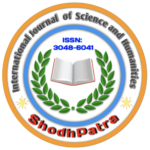| Article Title |
Contextualizing Climatic Migration in South Asia in Amitav Ghosh’s Gun Island |
| Author(s) | Dr. Sourav Kumar Nag. |
| Country | India |
| Abstract |
The article embodies three major aspects-the rising issue of climate refugees, the recognition of the rising crisis by the Indian government, and the contextualization of the issue in a critical reading of Amitav Ghosh’s Gun Island (2019). According to the United Nations Refugee Agency (UNHCR), about 50 lakh Indians were displaced in 2021 due to climate change (India Times June 17, 2022). ‘Climate Refugee’ is an underdeveloped and ‘uncared-for’ term for the group of people who are compelled to migrate from one place to another for a better environmental situation. Very recently, the Indian Govt. addressed the issue of Climate Refugee in a Lok Sabha Session and traced the root of the great derangement to colonial times: “Western nations have a historical responsibility to address the greenhouse gas emissions they have emitted” (The Hindu March 31, 2022). The issue of environmental degradation and colonial policies of forceful acquisition and exploitation of land are intimately related: “…you think the earth itself is dead … It’s so much simpler that way! Dead, you can walk on it, pollute it, you can tread upon it with the steps of a conqueror” (Aimé Césaire, A Tempest 1.2.124-5). In this context, Paul Driessen’s term ‘Eco-imperialism’ should be borrowed to critique the Western environmentalist discourses that have been imposed on developing countries. Very interestingly, the issue of displacement due to environmental degradation is triggered by a ‘push’ factor and the migrants have no hope of returning to their old place-the “homing desire” (Brah 180) in such cases remains absent. The national identities dissolve and the episteme of belonging is reformulated. The bioregional concerns of the environmental studies seem to topple down. In this context, a serious reading of Amitav Ghosh’s Gun Island (2019) seems to be relevant. Ghosh’s novel revives the legend of Chand Sadagar, the Gun Merchant. In the legend, Chand, a prosperous merchant from eastern India was struck by drought and floods owing to the sudden climatic change of the Little Ice Age (Ghosh 155). The Gun Merchant crossed the Bay of Bengal. In a way, he may be called a climate refugee. The article addresses the rising crises of climate migration and the evolution of the definition of belonging and nationalist discourse. |
| Area | Humanities |
| Issue | Volume 2, Issue 9 (September 2025) |
| Published | 24-09-2025 |
| How to Cite | Nag, S.K. (2025). Contextualizing Climatic Migration in South Asia in Amitav Ghosh’s Gun Island. ShodhPatra: International Journal of Science and Humanities, 2(9), 107-114, DOI: https://doi.org/10.70558/SPIJSH.2025.v2.i9.45351. |
| DOI | 10.70558/SPIJSH.2025.v2.i9.45351 |
ShodhPatra: International Journal of Science and Humanities

 View / Download PDF File
View / Download PDF File